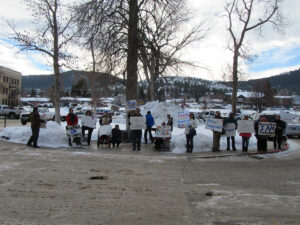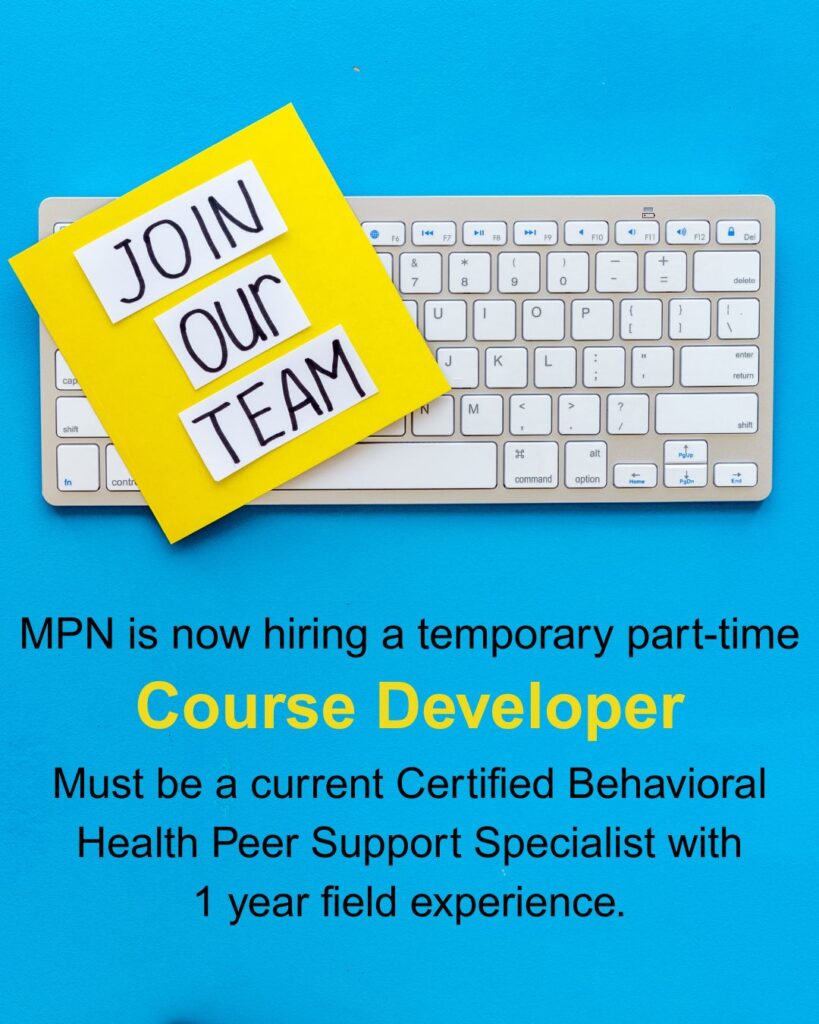We are a network of individuals who are on the path of recovery.
We identify as being in recovery from mental health, substance abuse and or addiction struggles. Together we share information, provide peer support, advocate with a united voice and improve the system. We come from places all across Montana, with different stories and experiences but together we make a difference. This is the Recovery Movement in Montana.



Realizing Recovery Blog
'Tis the (Stressful) Season
As we move into the holiday season, things can become overwhelming. Expectations of fun-filled time with friends and family are everywhere. Commercials, billboards, newspapers, specials of our favorite TV shows. People start asking what your plans are for the holidays. While this is an exciting time of year for many people, for others, it can bring on extra stress and negative emotions. Acknowledging these feelings can go a long way to making the season a little more manageable.
Personal Responsibiility
by Jim Hajny, Executive Director November 17, 2025 One of the key tenants of the recovery journey is personal responsibility. Holding ourselves accountable for our words, actions, choices and even our thoughts. The recovery journey is about change. Early in recovery this can be very challenging, we are often confused, in emotional distress and not…
Recovery: Day 1 Starts Here
Recovery is hard. It’s hard to start, it’s hard to maintain. The first year I found to be the most difficult. Life circumstances happen to everyone, major life challenges or circumstances in the first year of recovery can derail even the most committed. In the first year I found myself lost, confused and on shaky ground. Most people do. If you are reading this in your first year of recovery. I am with you. We, are with you. Fellow travelers on the road of recovery. You are not alone. I know I felt alone in the first year.
Dehumanization of Vulnerable Populations
As people in recovery, we know that forcing people to comply with specific types of treatment rarely works. Treatment courts often have incredibly high “success” while people are in the program but those successes drop dramatically when there is no longer the threat of incarceration. Effective, long term recovery must be freely chosen and individualized. I wrote about this back in August but it is in the forefront of my mind again because of some statements made by a candidate for city commission in Great Falls.
No Shame in the Struggle
September is a month filled with awareness and reflection, particularly for those of us who have witnessed the power of recovery, resilience, and healing. As we celebrate Recovery Month, it’s a time to acknowledge the often difficult yet transformative journey individuals and families face as they overcome mental health challenges.
For me, this month holds deep meaning. As a mother of two boys and a former Family Peer Supporter, I’ve had the privilege and the heavy responsibility of helping others navigate the complexities of mental health recovery. I’ve worked with families in distress, and I’ve watched individuals confront their deepest struggles. But I’ve also seen the incredible strength, courage, and growth that recovery can bring.
Recovery is a Journey
September is Recovery Month and my last month with Montana’s Peer Network. As the Families Division branches off and becomes a separate family-run organization, Family Peers for Hope, I have been reflecting on my time with MPN and what I have learned about recovery, particularly my own.
Dignity Over Detention
President Trump’s “Ending Crime and Disorder on American’s Streets” executive order from July 24, 2025 is chilling. Under the guise of “law and order” this administration seems to be targeting the most vulnerable populations. This time it is unhoused people but the implications for a wider group of people are obvious. Do we have an issue with people being unable to find and keep adequate housing in this country? Yes, we cannot deny that is a rising problem. There is a misconception that being unhoused is due to laziness, weakness, or a moral failing when it is actually a lack of adequate employment and extremely limited access to affordable housing that are the main causes of homelessness. The Supreme Court’s Grants Pass ruling opened the door to more criminalization by local authorities. Criminalizing homelessness and closing housing programs does not eliminate the issues that cause homelessness in the first place. We can look at least one community in our own state whose elected officials have blamed services for unhoused people as attracting unhoused people to the community and if those services were eliminated, that problem would go away. They even went as far as removing bus stops and requiring people to access public transit through a phone app and credit card.
An Avoidable Tragedy in Montana
When I first got involved with mental health advocacy in 2009, we were urging the legislature to address the broken mental health system. In 2025 advocates are still urging the legislature to address the broken mental health system in Montana. Back then we had funding for a community-based crisis system. We had twice as many crisis beds available, and we had a psychiatric hospital that encouraged and promoted mental health recovery. Today we do not have sustainable funding for statewide crisis services, we have less crisis beds, and we do not follow national standards for Montana State Hospital or for crisis response in Montana. In 2022 Montana lost its federal funding for Montana State Hospital because it repeatedly failed to meet minimum federal standards for health and safety. I would also include the increase in unhoused individuals in nearly every community in our state, many of whom have a mental health diagnosis.
Societal Issues Affecting Mental Health
It is hard to not see suffering on a daily basis around the world, in the United States and here in Montana. When I tune in for my daily dose of news, I am often struck by the lack of awareness around mental health related issues. For example, in Texas where the extreme flooding occurred there is virtually no reporting on mental health counseling, or peer support for the massive amount of grief and loss that is taking place. In the nearly weekly reporting of mass shootings at places of work, schools and in our communities across the nation, we fail to address mental health needs.
Chronic Disease Awareness Day
Managing the physical, mental, and emotional toll of chronic diseases can be isolating for both the individual and their family. As people in recovery and parents/caregivers of children with special healthcare needs including behavioral health, we know firsthand the feelings of frustration, isolation, despair, and hopelessness. We know the challenges of finding treatment and advocating to be heard. We know the hope in finding joy and meaning living with chronic health conditions.
Advocacy
Check out our new page dedicated to tracking state and federal bills, executive orders, and lawsuits.
 Standing up for what we believe is right, having a voice, making choices in recovery, and sharing our own recovery story are some of the things that make up advocacy and self-advocacy.
Standing up for what we believe is right, having a voice, making choices in recovery, and sharing our own recovery story are some of the things that make up advocacy and self-advocacy.
Let’s start with self-advocacy which refers to an individual’s ability to effectively communicate, convey, negotiate, or assert his/her own interests, desires, needs, or rights. It involves making informed decisions and taking responsibility for those decisions (Van Reusen et al., 1994).
Knowing yourself and your strengths, needs, and interests is the first step toward advocating for your rights. Once we begin to find our way on the path of recovery, we may want to begin to advocate for ourselves with those around us—peer supporters, friends, family, service providers, and doctors. These conversations may be difficult, but having them is vital to your recovery. Remember, you are the expert on yourself.
It may be that prior to getting on the path to recovery, others were making decisions for you or acting in what they believed to be your best interest. Now may be the time for you to let others know what you believe to be in your best interest. You may find yourself in the process of taking control and making decisions affecting your life and perhaps others’ lives. This process of self-determination means making informed choices, problem solving, setting and attaining goals—essentially being a self-advocate.
Advocacy or advocating for others may be something you are interested in doing. Advocating for another person isn’t about acting in a person’s perceived best interest, but it is standing with a person to ensure they are able to articulate and obtain what they want or need. Perhaps you may consider speaking up and advocating for various changes in the services in your community.
Here are a few examples of advocacy:
- Speak to your legislature or a special committee.
- Get involved with an advocacy group or organization.
- Share your recovery story to support others in recovery.
- Whether advocating for yourself, for others, for your community, or as part of an organization, advocacy is very self-empowering. You can make a real difference in your life, the lives of others, and even the community.
- Reach out to Montana’s Peer Network and share your recovery story on one of our “Recovery Talks” podcasts.
Advancing Advocacy Blog
Human Rights When It Comes to Mental Health
When I began this article, I was going to write about involuntary commitment, in particular for young adult children by their parents. But after spending hours writing and talking to others, I was more confused than when I started. I was left with more questions than answers. And maybe that’s how it should be. Maybe we should wrestle with it. Maybe there is no right or wrong stance but many answers that depend on numerous variables.
Special Education: My Perspective
In honor of National Special Education Day on December 2nd, I am sharing my personal story in the hopes of dispelling stereotypes of what Special Education services means for students now and for their future. Growing up, and even 18 years ago when my daughter started receiving special education services, I would hear terms like “short bus” or “sped kids” which referred to students who received special education services or had an Individualized Education Plan (IEP). Though I don’t hear these terms as much today, I know they still exist and the negative attitude towards these students still exists.




